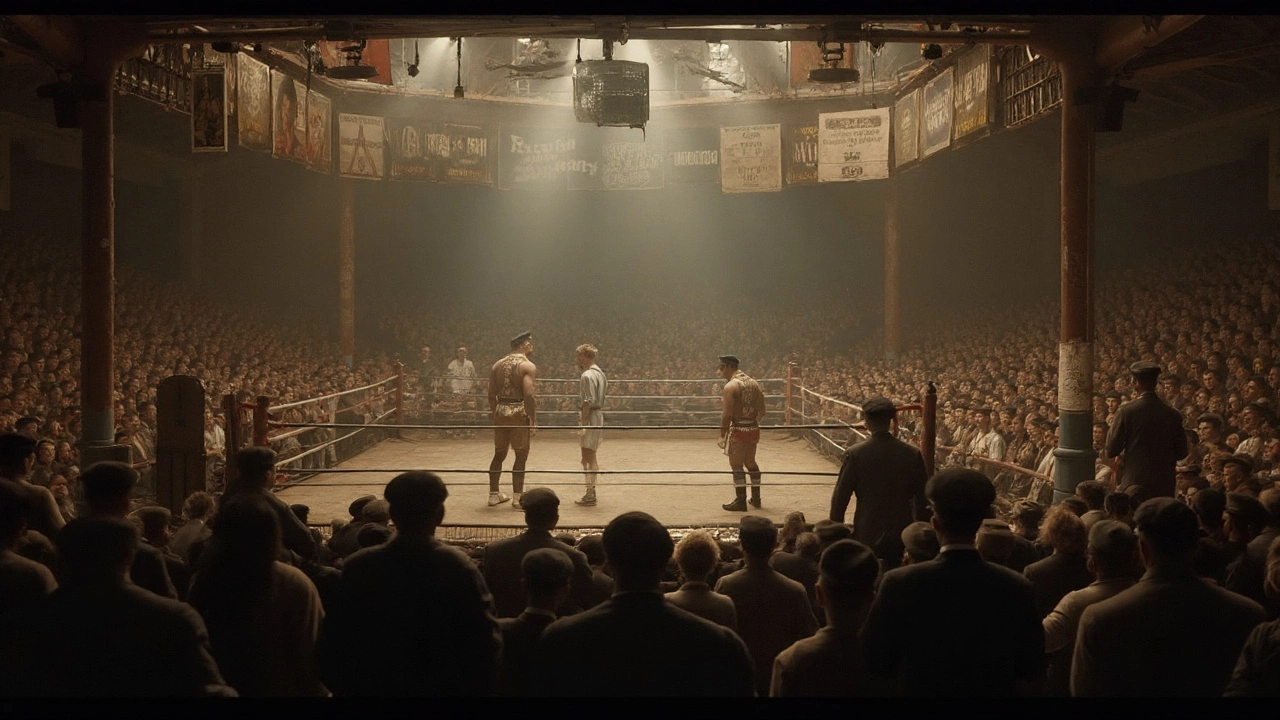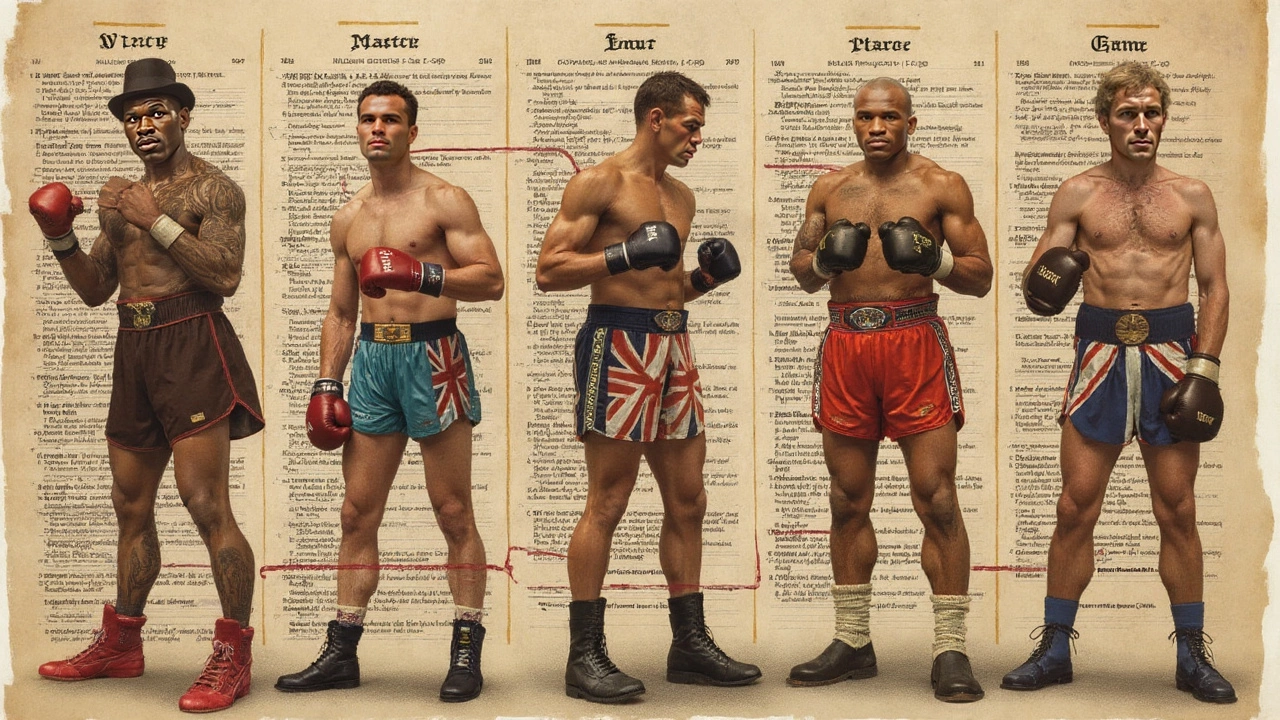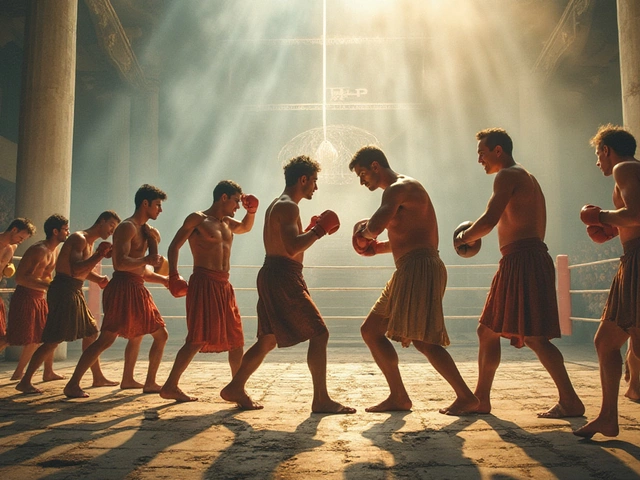Boxing Match vs Boxing Game: What Do We Really Call It?

Ever heard someone say, "Who won the boxing game last night?" and felt a weird twinge of secondhand embarrassment? It’s not just you. The simple act of deciding whether to call boxing a "match" or a "game" can stir up everything from light teasing in sports bars to heated debates among fans. This isn’t just about language—it’s about tradition, respect, and the unique character of boxing itself. Why does calling it a "boxing game" make seasoned fans squirm? Let’s break it down, clear up why words matter here, and get a few laughs along the way.
Where Does the Confusion Begin?
A lot of the mix-up comes from how we talk about other sports. You’ll hear people going to a football game, a basketball game, or even a baseball game. "Game" feels generic, cozy, and fits almost everywhere. But step into the world of boxing, and suddenly, the story changes. Here, the right word is "match" or sometimes even "bout." Where did this difference come from?
Boxing didn’t just pop up in a stadium with a scoreboard and timeouts. Its roots go way back, to ancient Greece and Rome, and then to the bare-knuckle fighters of 18th-century England. Back then, the word "game" was used pretty loosely in English. But when boxing developed as an organized sport—rules, gloves, rounds—the word "match" took hold to describe a formal contest between two fighters. That’s why today you’ll rarely, if ever, hear pro announcers or commentators use the word "boxing game." It’s always a match, a bout, or sometimes “fight.”
So, why does this matter? For one thing, calling it a "game" makes boxing sound a bit, well, soft. Unlike team games where playfulness is part of the fun, boxing carries a sense of risk, resilience, and even danger. Matches aren’t just about outscoring an opponent—they're about outlasting, outwitting, and often taking a beating in the process. This sense of seriousness bleeds into the language. Fighters train not for fun, but for survival and glory. You can’t “play” boxing in the same way you play basketball or chess—you fight.
This cultural distinction sticks. A quick look at broadcast guides or event posters lays it out: “Heavyweight Title Match,” “Lightweight Championship Bout,” “World Title Fight.” Never “game.” Even when kids spar at the local gym, trainers talk about their “matches” in tournaments. The word “match” underscores the one-on-one nature and the combative spirit at the heart of boxing.
But let’s dig into practicality, too. Some languages don’t have this split. For example, in Filipino, “laro” (game) sometimes applies, while Spanish speakers use “combate” or “pelea.” Yet, in English, the word “game” rarely shows up, and if it does, it’s usually from a newcomer or someone unfamiliar with the sport’s lingo. Sticklers in the boxing community may correct you—in forums, gyms, and on social media. For good reason: tradition counts.
The word “game” can also trivialize the outcome. When a fighter wins, it’s not just a point added—it could be a change in career, a lifelong achievement, or a truly brutal loss. In sports like soccer, you draw or lose a game and move on to the next one. In boxing, one bad match can mean retirement, injuries, or even, in rare cases, tragedy. Words matter because they reflect reality.
Still, let’s be real. If your uncle calls it a “boxing game,” he probably means no harm. He’s just casual about his sports. The important thing is, the community of boxing—from gyms to ringsides to broadcast booths—calls it a “match.” Not because they’re snobs, but because those few letters hold decades of struggle, pride, and history.
Here’s a little table to sum up what different sports call their competitions, just for fun:
| Sport | Usual Event Name |
|---|---|
| Boxing | Match/Bout/Fight |
| Football | Game/Match |
| Soccer | Game/Match |
| Basketball | Game |
| Wrestling | Bout/Match |
| Tennis | Match |
See how boxing stands out? If you want to sound like you know your stuff, box the “game” off your vocabulary.

The Culture and Ritual Around Boxing Matches
Boxing isn’t just a sporting event—it’s practically ritual, wrapped in modern glitz but rooted in gritty tradition. When two fighters enter the ring, they’re stepping onto a stage that’s more than a square of smelly canvas. There’s a whole culture surrounding a *boxing match* that only makes sense if you see it as something above a casual “game.”
Think about the weigh-in. You never see teams lining up for a “basketball weigh-in.” There’s the stare-down, the press conference, the posing. Fighters show up battle-ready, mentally sharp, sometimes a bit theatrical. All this builds up the tension before even a single punch is thrown. This pre-fight ceremony is unique, and it marks boxing as a world apart.
And after the weigh-in? People gather for undercard matches—essentially opening acts, where up-and-coming boxers get their shot to impress. The air buzzes with anticipation. The main event is always called a match or a bout. Nobody goes, “Wow, what a great basketball-like game we’re about to see!” Around the ring, the energy is all focus and seriousness. Coaches give final pep talks, cutmen wrap hands and prep sponges, and promoters hype up the crowd. This lead-up is way more dramatic than the “let’s shoot some hoops and see who wins” vibe of game-centric sports.
Boxers themselves talk about the fight game, but what they mean isn’t the literal “game” like in chess or baseball. They’re talking about the world of boxing as a grind, a hustle, a journey. Legends like Muhammad Ali, Mike Tyson, and Manny Pacquiao, they all refer to their “boxing careers” and “big matches.” Nobody wants their achievement minimized as just another “played game.”
Compare pre-match statistics. In boxing, you’ll see tale of the tape: age, height, reach, weight, win-loss-draw records. This is serious business, and it gives you insight into each fighter’s chances. Here’s a look at what these numbers can show:
| Fighter | Age | Height | Reach | Record |
|---|---|---|---|---|
| Canelo Álvarez | 33 | 5'8" | 70.5" | 61-2-2 |
| Oleksandr Usyk | 38 | 6'3" | 78" | 22-0-0 |
Not your standard “points per game” stat sheet, right?
The respect for winners and losers is major, too. You don’t just shake hands and walk off. Whether it’s a knockout, a close decision, or a draw, corners rush in, medics check fighters, families celebrate or console. Each match can be a turning point. Win, and you might get a title shot, more pay, a lasting reputation. Lose, and it could take months—or a lifetime—to recover.
Fans know this, which is why boxing audience energy is different from crowd noise at a football game. There’s tension, almost worry, mixed with excitement. You’ll hear gasps when punches land clean, cheers after late-round comebacks, and total silence if a fighter goes down. It’s not just points or a win—sometimes someone’s health is on the line. Calling it a “game” just doesn’t seem to capture any of that.
Here’s a useful tip for beginners: if you ever find yourself ringside or chatting with other fans, use “boxing match” or “bout.” You’ll sound like you belong, and you’ll show you respect the fighters. The tradition is strong here—a 2023 poll among boxing coaches at amateur gyms across the US found that 97% used “match” in their classes, while only 3% slipped and said “game.” If you’re serious about the sport, the difference matters.
One more thing that sets matches apart: judging. In team games, refs call plays, but in boxing, judges score rounds based on things like ring generalship, defense, and clean punches landed. It’s subjective, but detailed. Here’s a quick outline of judging criteria:
- Effective aggression
- Ring generalship
- Defense
- Hard, clean punches landed
This scoring system is unique to matches, not games, which usually revolve around points per action or per goal. In boxing, styles make matches, as they say. Will you get a counter-puncher vs a brawler? A technical master vs a slugger? These matchups are what fans talk about for years.
Event organizers, ticket sellers, streaming platforms—all stick to the word “match.” Check out ESPN, DAZN, Showtime—nobody offers you a “boxing game pass.” You sign up for major PPV “fights” or “matches.” The lingo’s everywhere, and for good reason.

Boxing in Popular Culture: The Language of Fighting
The words we use don't just label things—they shape how we feel about them. In movies, music, and the press, boxing is front and center when it comes to sports language you actually remember. Think about “Rocky.” Throughout all six movies, you’ll never hear the announcer yell, “And now, the main boxing game of the evening!” It’s always “the bout,” “the fight,” or “the championship match.” Language keeps the drama intact.
When reporters write up stories for major matches, headlines never read, “Tyson Fury Wins Heavyweight Game!” Instead, it’s “Fury Triumphs in Heavyweight Fight,” or “Fury Claims Title Bout.” Sportswriters know their audience expects the proper term. Even comment sections get testy if someone fumbles and calls it a game. It’s not just about sounding smart. The right word means you get it.
The influence of combat language also spills over into everyday talk. We say people “fought for their rights,” not “played a game for their rights.” Big business mergers are “battles,” never “games.” Playful trash talk or rivalry can happen in team sports, but rivalry in boxing often takes on a real intensity. It’s bragging rights, legacy, a sense of finality —all baked into the idea of a match, not a game.
Here’s a quirky fact: According to a UK-based sports linguistics study from 2020, 88% of mentions in print and digital media used "boxing match" vs. just 0.5% that accidentally or humorously referenced a “boxing game.” Language isn’t just stuffy tradition—it’s what makes the sport recognizable and respected.
Want to see how this plays out internationally? In Germany, they say "Boxkampf" (boxing fight); in French, it’s "combat de boxe." Similar story in Italy ("incontro di pugilato"). All carry a sense of clash, encounter, direct opposition. Nowhere is “game” getting air time.
If you’re new to watching boxing and want to get more involved, you have a couple of tips to keep from standing out (in the wrong way) in conversation:
- Stick to “match,” “bout,” or “fight” for boxing. Unless you’re joking, never use “game.”
- Refer to fighters as “boxers” or “fighters,” not “players.”
- Talk about “rounds,” “judges,” and “cornermen” rather than coaches, referees, or half-time.
- If you want to compliment a great fight, say “That was a hell of a match!”
The upside? You’ll sound like you belong, and you’ll avoid the kind of slipups that turn a casual chat into an unplanned lesson from hard-core fans. Sports are about community, and language is an easy entry ticket.
If you want to dig deeper into boxing history, one cool thing is how matches have marked milestones—not just in sports, but in society. The "Fight of the Century" between Muhammad Ali and Joe Frazier in 1971 drew 300 million viewers worldwide, making it one of the most-watched sporting events ever up to that point. Ali didn’t “play a game.” He dueled, he clashed, he fought. Words amplify the story.
At the end of the day, the answer is simple. A boxing contest is a *boxing match*—rooted in tradition, risk, history, and the kind of epic showdown that “game” just can’t describe. The next time the subject comes up, you’ll know exactly what to say (and what not to say)—and you might just win a few bets at trivia night, too.




